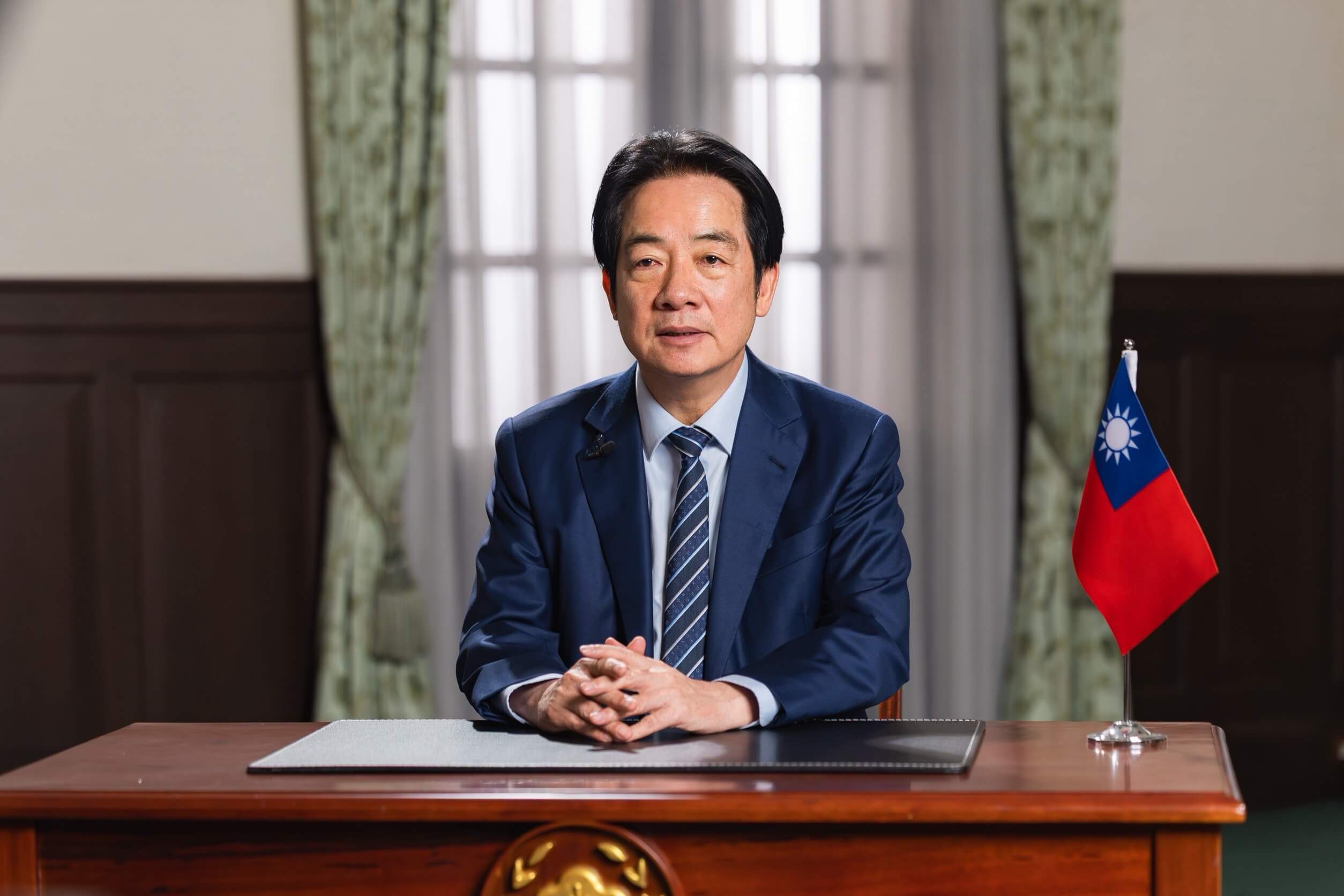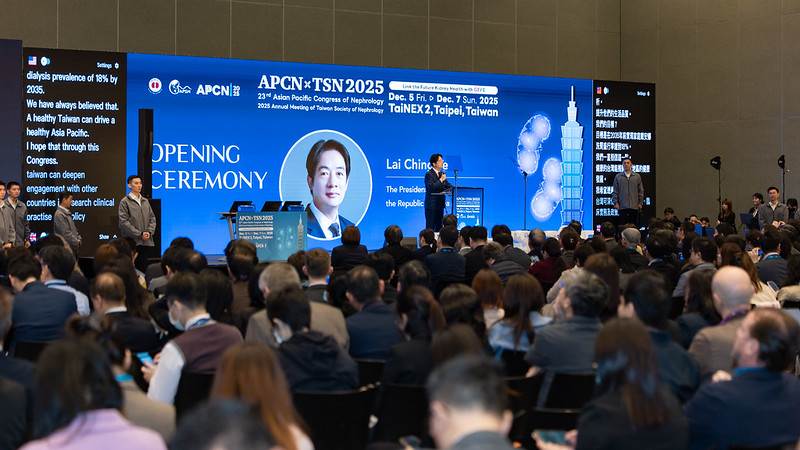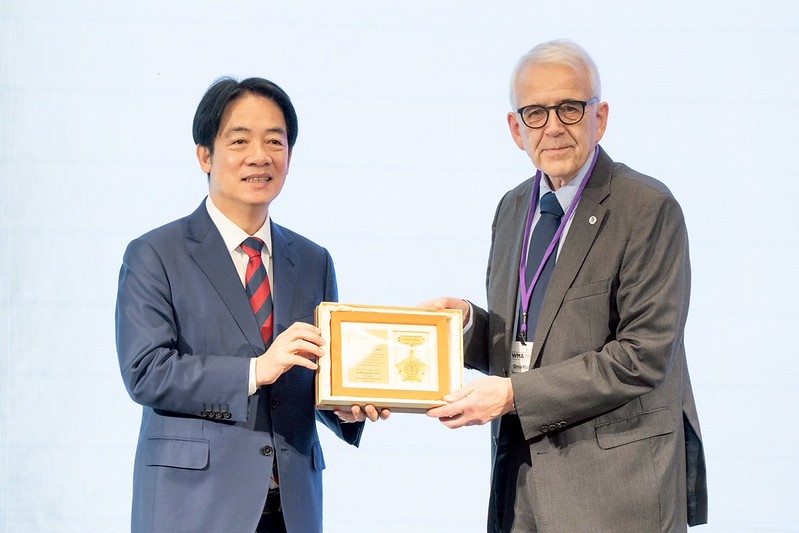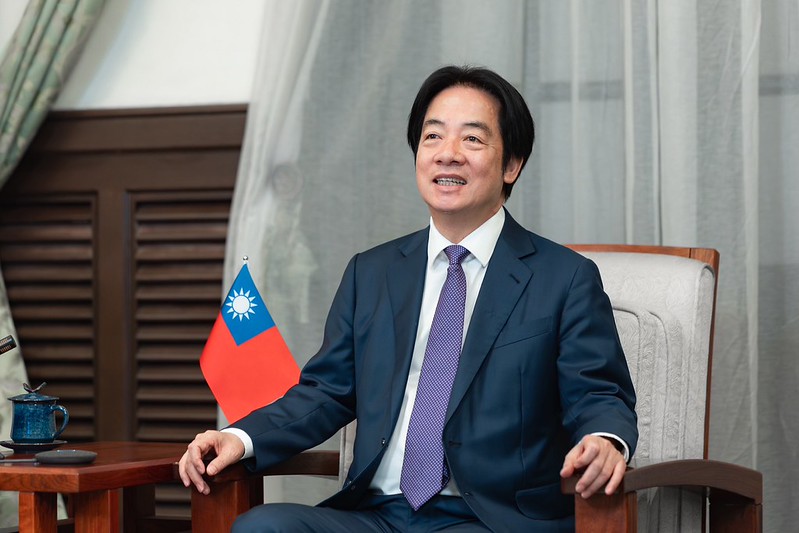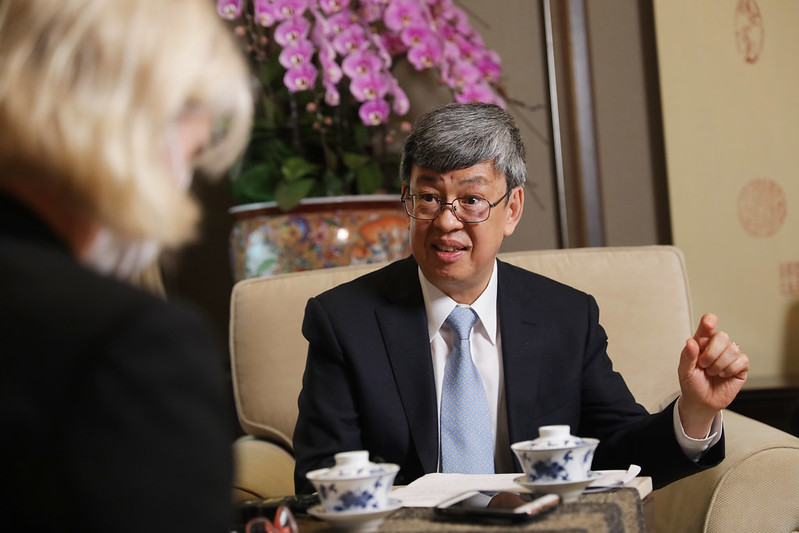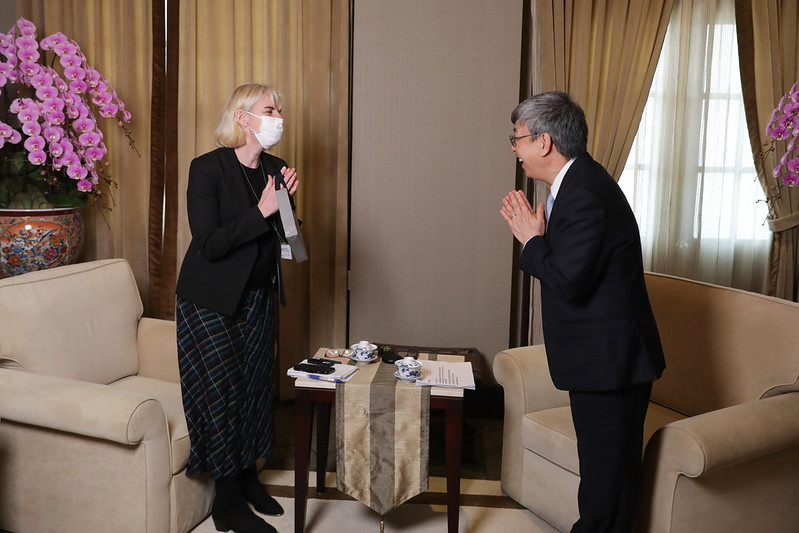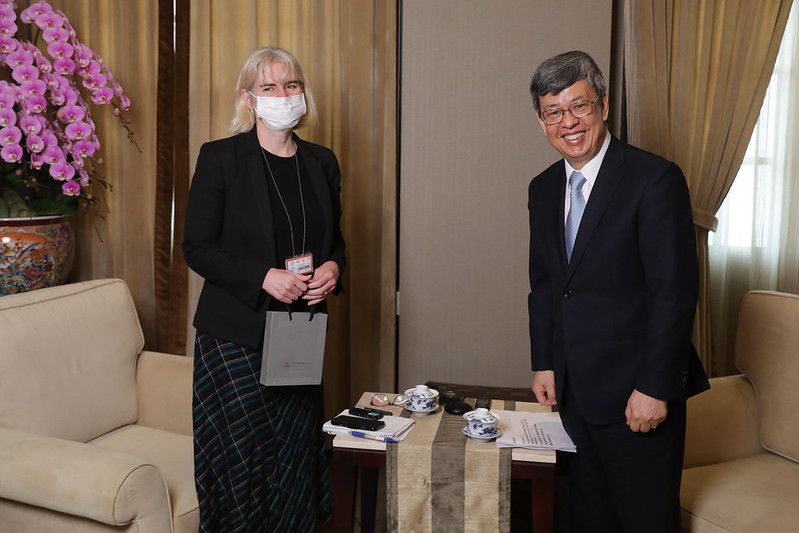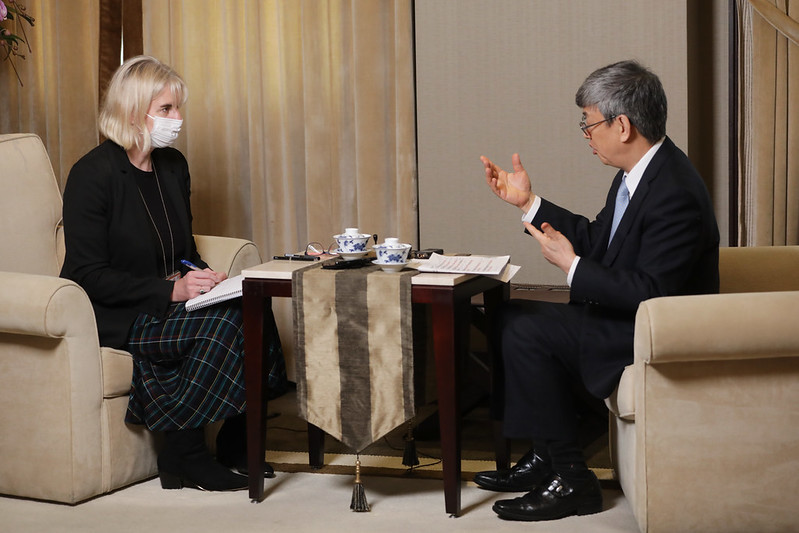News & activities
 News releases
News releases
Vice President Chen Chien-jen was recently interviewed by The Daily Telegraph, and responded to questions regarding issues such as Taiwan's experiences in fighting the coronavirus disease 2019 (COVID-19) outbreak, disease prevention strategies, the impact of Taiwan's exclusion from the World Health Organization (WHO), and international cooperation to fight the pandemic.
Following is the text of the interview:
Q: So maybe we could start first of all with looking back at Taiwan's history, recent history. You were hit very badly by the SARS outbreak in 2003, 2002. So what did you learn from that, and did you plan for mass testing in a future pandemic? What did you plan in terms of equipment, PPE, extra capacity in ICU, ventilators, critical care beds?
A: Basically, dating back to the year 2003, we had very severe attack of SARS outbreak in Taiwan. And from this SARS outbreak event, basically we learned a lot from it. And there are three major items I would like to mention: prudent action and rapid response, as well as the early deployment. And from this and the prudent action, I think that it is very important for us to monitor this and any emerging infectious disease around the world. And dating back to year 2002, and we get early information from Hong Kong, and then we know that there's a SARS outbreak. But at that time, we consider that the disease won't spread out so quickly, but it's not the case. And I think the monitoring of any emerging infectious disease around the world is very important, especially in this region. We know that China is a big country, and there's a lot of people there, and a different kind of emerging infectious diseases appeared in this country. And I will say that, in addition to SARS in 2003, there's H1N1 avian flu in 2005, and also there's H7N9 avian flu and also this time the COVID-19. So we know that once we are quite near to China, so we have to be very careful to monitor if there are any kind of emerging infectious diseases. And fortunately, our colleagues in Taiwan CDC, from this and PTT from the internet, they found an announcement in Wuhan on December 31. Then, a vice director-general shared the information in their group and then they send some emails to the Chinese CDC, and also they send to the WHO, IHR counterparts.
So basically, this is a kind of a spirit we found that we have to prudently and very carefully monitor all this possible disease around us. And the second one is the quick announcement of the travel alert if necessary. And the third one is the optimization of border quarantine to identify any imported cases. For instance, for this time, when we know that there's a so-called atypical pneumonia in China, it means an infectious diseases without known the cause. And then they already isolate the patient for treatment, it means that it's quite likely to have person-to-person transmission. So, we implement that onboard quarantine for all passengers from that direct flight back from Wuhan. So, optimization of border quarantine is very important. And then, the reinforcement of this 14-day home quarantine of close contact of passengers from the affected area is also very important. And at that time, when the SARS outbreak [happened], we found that those home infections, hospital-acquired infections are very dangerous. So we have to be very careful about it. So upgrade of healthcare system for infectious diseases, especially for hospital infection control, and to have isolation room for infected people, is very important. And we definitely have to have a national network of the healthcare centers for infectious disease. This time, we adopted that our several medical centers, they have to take care of patients in their own isolation room in order to not squeeze every patient into one hospital. And this kind of strategy has to be planned before any kind outbreak. And of course you just mentioned about this PPE. The adequate supply of PPE and other medical materials are very important. Dating back to year 2000, we run short of N95 face masks, and it is quite challenging to us. So this time we learned from it, and we know that we have to have a rationing system for face masks and also we have to increase our production, the manufacture of face mask. And thanks to our national team for face masks, we nowadays may produce more than 13 million face masks per day.
Q: Thirteen?
A: Yes. Thirteen. And we are expecting to have 15 million face masks [daily] in the coming week, I think. So, and then there's a promotion of health education to let people know what they have to do when there's a home quarantine or what school children have to do when they were at school, and so forth. The health education is very important, and risk communication is also important. So we have to keep all this outbreak information quite transparent. An open data system is definitely essential.
Q: Great. Can I ask you just briefly on the equipment? How many critical care beds do you have per head of population, and how's your—what kind of supply of ventilators do you have?
A: Okay. For the ventilators and as well as for the isolation rooms, the necessary negative pressure isolation room, in full capacity, we may have 20,000 rooms for the isolation room and 14,000 ventilators. That's the situation in Taiwan. And another thing is that we have to set up the National Epidemic Command Center, because control of an outbreak is not only the mission of the Ministry of Health and Welfare, it's an inter-ministerial effort. We have to talk about border quarantine, that's the Ministry of Transportation and Communications involved, and also there is the Ministry of the Interior, which is also important because the policemen and the civil welfare workers have to do this home quarantine people checkup and so forth. So this National Epidemic Command Center is very essential in order to coordinate and integrate all the efforts of different ministries in Taiwan. So basically, we learned that one thing that's very important, that everyone in this country has to be involved in outbreak control, not only the Ministry of Health and Welfare and not only the government; the government and the people are all important.
Q: Taiwan has a population of close to 24 million. It's an island. How can its pandemic strategy be successfully replicated in other bigger countries like the US or the UK? Is there more that these countries could have done to prepare better? Is it too late for countries that already have wide community spread to copy Taiwan's successful model? Or can lessons still be learned?
A: Yes, sure. It is never too late to control any kind of outbreak in any country. Of course, all these strategies have to be adopted by a country according to their time and place of the current situation, but I think that there are still a lot of chances for different countries to adopt good strategies developed here to help the containment of the outbreak. For instance, social distancing is definitely very important and I think that in Taiwan we implemented social distancing and it was also done in different countries. But I think that social distancing is important, but another thing that's also important is how to teach this, let people know to maintain a very good health behavior. I mean, wash your hands frequently, measure your body temperature and also put on your face mask if necessary, and, at home, if they are close contacts, they don't live together or don't dine together, they can live in the single room and so forth. I think this kind of health behavior has to go together with social distancing and they cannot separate them. And also for social distancing, I don't think that it's necessary to stop all these activities of the people. According to the theoretical calculation for social distancing, as long as there is more than 50 percent of the total population engaged to reduce 50 percent of their social contacts, then the outbreak can be controlled. So it is unnecessary that all the activities be stopped. So they can go to school, go to work, go to do any necessary work. But they have to reduce the so-called not-so-essential or not necessary recreation, like going to recreation centers, tourism, and so forth. So, I think that as long as people change their lifestyles and reduce their unnecessary social contacts, then the disease can be controlled quite well. So social distancing is one thing, and I think that home quarantine is definitely important for all the countries. Once there is close contact, they have to stay at home for 14 days. And during this period of time, we have to check their health status. That's our policeman and our civil workers that help us to check all these home quarantine people, that have a telephone contact every day to check about their health status and what they need, what help they need. And through this way, then people at home will say, "Well, they are safe and they are taken care of." So I think it's very important. Home quarantine is also very important. And the third one, I think, is that it's important is to supply adequate PPE to the frontline healthcare workers and in the UK, as well as in the United States, they are trying their best to do that. And Taiwan is also willing to help. And I think another thing that is also important is, we have to help each other and to collaborate with each other to develop rapid diagnostic tests, antivirals, or even vaccines, as soon as possible. And through these efforts, I think that we can contain this outbreak.
Q: Yes. Just on the UK specifically. Is there anything that... Unfortunately, we're seeing high infection rates, high death rates... Is there anything you'd recommend to the UK in particular? Could mass testing help in this case?
A: In Taiwan, we didn't practice any mass testing. The reason for that is that among the 395 confirmed cases, there is only 14 percent [that] were locally transmitted. And among these 55 cases, only 10 [cases] we could not trace back their infection sources. So we can trace this transmission chain, propagation chain, quite clearly, so we don't need to do mass testing. As long as there are a lot of patients without known infection sources, then you have to do mass testing. But sometimes mass testing is not efficient and also not cost effective, so I think there's something between the mass testing and designated testing. I would suggest that you have to test these close contacts as the first priority. And then the high-risk group—the high-risk group means health care workers and cashiers of the supermarkets and drivers of public transportation, vehicles such as buses and taxis, and so forth. These are the people at high risk of infection, and they have to be tested first. If they are not infected, then the others won't be infected either. So it's important to do high-risk testing. But sometimes you have to identify—have to classify, who's at high risk and who's not. Anyone who's a colleague or classmate of these people, I mean close contacts, they definitely have to be monitored more carefully. Otherwise you will spend a lot of time but with very low efficiency and not so effective.
Q: When you look at Western pandemic planning documents, it's clear that they never envisaged this type of lockdown that we're seeing now in Europe or parts of the US. Why do you think that was, and do you think that Western countries could have used the two-month lag better to learn more from Asia about how Asia was tackling this pandemic?
A: Unfortunately, Asian countries are always in greater danger to come across this attack by these emerging infectious diseases. I just mentioned the reason for that. So when there's the SARS outbreak—you name it—there's Vietnam, in Hanoi, and also in Singapore and Hong Kong, they were severely affected. So we are a so-called biological time bomb. The emerging diseases will come out now and then so it's very difficult to predict. So we are much more well prepared. That's the reason why in Hong Kong and Singapore they are also doing a very good job. And in Korea, they didn't have the SARS attack, but they have the MERS issue, so they learn from it. And when there's an H5N1 outbreak—it's avian flu, but it can transmit to humans and then of course the fatality is very high. At that time there's Korea, Japan and Southeast Asia—we all have kept alert to it. So basically, we're in a much more dangerous situation than people in America and Europe. So I think that people always learn from disasters, so I think this is very important. But I would like to say that, nowadays, our world is getting smaller and smaller into small villages. We are all family, and we definitely have to share this information and get it very transparently and very rapidly to let everybody know. So basically, I would say this is the mission of the World Health Organization. Once they get an alert, they have to be very vigilant to it and then quickly respond to it. I would like to mention about this situation. After the SARS outbreak in year 2003, WHO set up a so-called alert system PHEIC, Public Health Emergency of International Concern. And when there was an H1N1, new influenza in 2009, they announced there's a PHEIC around one month after the first case occurred. At that time, only three countries were affected, and then they announced the PHEIC to let everybody know: "Hi, there is a danger!" And everybody had to pay attention to it. So the whole world developed rapid diagnostics, we prepared this antiviral Remdesivir as well as Tamiflu, and then we developed a vaccine very quickly. That was in May of 2009, and by September of 2009 we already have the vaccine to it because we get this alert quite quickly. But for this time, the COVID-19, the first case—well somebody said early December, some people said mid-December of 2019. But this PHEIC was announced at the end of January, and even worse is that, at that time, they still considered that this PHEIC is a Public Health Emergency of International Concern, but we don't need any kind of travel alert. I cannot imagine that. In that case, why do you announce that there's a PHEIC? And at the time, there were already 19 countries affected, with more than 8,000 reported confirmed cases. So it's too late. So I think it's very important we have to listen to the one who's responsible for collecting all this information. All countries have to be alert and have to respond very quickly.
Q: Why do you think the WHO's response was different than during COVID-19, and what impact has Taiwan's exclusion had in this instance on Taiwan and the rest of the world?
A: Well I don't know why WHO didn't—because WHO didn't invite us to participate. There's an emergency meeting on January 22 and 23. But before then we already sent a request to China's CDC to send our two experts to Wuhan to look at the situation. Although we did not get any so-called very informative information, based on their observations and personal dialogue, we found that the situation was quite severe. And also, we considered that the situation in mid-January was really worse [bad]. At that time, they already discussed whether to isolate the entire Wuhan city or not in mid-January. I don't know why the WHO did not take action as quickly as previously for H1N1 or even for SARS. When there was the SARS outbreak, we were not involved fully. At that time [WHO] Director-General Dr. Gro Bruntland, who used to be the Prime Minister of Norway, although she had very big political pressure, she still sent a delegation to Taiwan and asked the US CDC to help Taiwan before the WHO delegation came here. This time I really don't know why WHO responded so differently.
Q: When you say that your experts went to Wuhan in mid-January, who was considering at that point a lockdown of the city? Was that the local health authorities in Wuhan?
A: Because the situation in the hospitals in Wuhan was really worse [bad], and also in Wuhan we found one thing that is very important. They paid much more attention to the hospitalized severe cases, and when we asked how did you follow up to trace the close contact and how did you take care of this with patients with mild symptoms or signs, we didn't get a very good response. To us, there's a very good way to do this, and if very close contact tracing is done, then the disease won't be spread by the patients. If not isolated and treated in the hospital, they will transmit it. They had mild symptoms, and [the authorities] didn't take care of [following up on] the close contacts of the patients.
Q: So what do you think in general of China's response to this pandemic, and do you have any insights into how this virus started?
A: Well, I think on the frontline, healthcare workers in Wuhan were doing a very good job taking care of the severe cases of atypical pneumonia with unknown causes. And I think they also tried their best to share the information with the health authorities in Wuhan. But I don't know why this information was not taken into consideration very seriously. Usually, epidemiologists or infectious disease physicians consider that once there is a cluster of patients in the hospitals, it only represents the tip of the iceberg. The severe cases are only the [tip of the] iceberg. There must be a lot of infected people. So that's the reason why some medical doctors in Wuhan shared this warning with their colleagues, but unfortunately it was not taken into consideration very seriously.
Q: Do you think that there was a political cover-up?
A: I really don't know, but if we compare it to the alerts of healthcare workers, the alerts were not sent out to the public, not mention to the entire world.
Q: You mentioned earlier that your own CDC had seen a notice on PTT from the Wuhan authorities. What did that notice say?
A: The notice said that there are seven cases of atypical pneumonia, and that they were atypical pneumonia but not considered SARS. The specimens were tested for possible causes. However, all these patients were isolated for treatment. And the PTT had another announcement by the health authority, but it was just kind of a general announcement, not very serious like an alert.
Q: Do you believe that based on your medical intelligence, that the virus began in a market, as has been suggested?
A: Originally they were saying that the virus originated at Huanan Seafood Market, but if we look back at all the reports among the first 42 cases published in academic journals, around 10 of them have no history of going to Huanan Seafood Market. I think that this is a very important hint to us that Huanan Seafood Market may not be the origin of this infection. There were cases of infection in Wuhan in the beginning of December [2019], and in the middle of January [2020] there were cases reported in Thailand, Hong Kong, and Japan. But none of those cases had any history of going to the Huanan Seafood Market. So Huanan Market, maybe there is a small cluster there, but not all of them got infected there. And I think that from an epidemiological point of view, once there's a patient or a cluster of patients, you have to ask all their contacts, and then to follow these contacts. [You have] to trace two things: their infection sources and whether the surrounding people have been affected. But they have never paid attention to these so-called mild or asymptomatic cases.
Q: Looking ahead now, we can't stay isolated forever, we can't keep our borders closed forever. What in your view is the right exit strategy to wind down the lockdowns? Will it happen in phases, in social groups, in regions?
A: Basically, I always consider that COVID-19 is becoming flu-like. It means that it's highly contagious and also has a large proportion of mild cases or asymptomatic cases. And also, it can be transmitted through droplets and also contaminated areas. I think that we won't get rid of this kind of virus totally. It will stay with us. If this is the case, then it's something like the H1N1 new influenza in 2009. So we definitely have to prepare for its long existence. That's the reason why we have to develop rapid diagnosis and also antivirals. If we have rapid diagnosis and antivirals, then the mild cases can go to private practitioners. And then they get the rapid diagnosis. Once they're [tested] positive, they can get the antivirals. The mild cases can be treated very well in the community by private physicians. Severe cases we'll send to medical centers. In the medical centers, we also have this rapid diagnosis and antivirals, and then we can treat the patient. Once the patient is cured, it means the virulence is going down. Then it won't infect others, either. So treatment of patient using antivirals basically is to cure the patient. Another important thing is protect his or her close contacts from being infected. The third thing, maybe in the future in, maybe, one and a half years, we may have a vaccine. If we have the vaccine, then we can use vaccination to prevent the disease the same as in [the] 2009 influenza pandemic, and it's quite helpful. But before that, we definitely have to keep social distancing. I just mentioned that it's not necessary to stop all activities, as long as more than 50 percent of the people reduce 50 percent of their social contacts, then we can live in a limited way, but still make our daily living, a so-called semi-normal.
Q: Is there a way that we can coordinate better globally in terms of the exit strategy? Every country is at a different stage. So how do we open up travel and trade again? How do we coordinate that response?
A: I think that in order to coordinate better on international transportation and so forth, I think that all the nations have to open their data and make their outbreak status very transparent for others to let the people know that some of the countries have only sporadic cases, and so forth. We need to carry out some so-called zero epidemiological studies, to test the blood of a sample of the people to know what's the infection status of each country. I think that we have to be sure that the disease won't be spread out. We have to be very careful that if we want to wind down the lockdowns, then we have to be sure that the big outbreak won't come again. Basically, nowadays, I'm discussing how to do this 'return to normal' with different universities such as Columbia, Johns Hopkins, and Stanford, and so forth. We are thinking about that. It's not ready yet. Maybe I just mentioned that we have to rely on new rapid diagnostics, antivirals, and vaccines. Before that, we still have [to limit] our social contact frequency a little.
Q: Just finally, I'm aware of the time, but could you just tell me a little bit about Taiwan's contribution in terms of developing these diagnostic tests and also a vaccine?
A: There are three groups in Taiwan that are developing vaccines in collaboration with different international groups. One is Academia Sinica; another is the National Health Research Institute, and the third one is a private industry [company] that's Medigen. Medigen is collaborating with the US NIH to develop the vaccine. So we have three vaccine development teams in Taiwan in collaboration with the EU [and] with the United States to develop this vaccine. With regard to the rapid diagnostic, they are preparing this so-called prototype. They are doing clinical validation of this rapid diagnostic. I know that Academia Sinica has had discussions with EU countries; Taiwan and [the] Czech Republic have signed a bilateral cooperation agreement to do R&D together and collaborate with each other. So for the rapid diagnostic, there are two types. One is to test some antigens for the virus. Now we use RTPCR to do that but we hope that someday we can have a much rapider diagnostic. Another one is to test the blood, the serologic markers, and to test antibodies. So those are two ways we are doing that. We hope that all these efforts can be done quite well and then we can get a license as soon as possible and of course we are more than glad to share all our new developments and new diagnostics [with] all the countries in the world just as what we have been doing for face masks. I think it's important. And with regard to pharmaceuticals, now we have this quinine, and we are also involved in clinical trials of Remdesivir. Clinical trials in Taiwan seem quite successful. Remdesivir is quite good for severe cases, but also even better for mild cases. We have some argument among colleagues: "Should we use antivirals for mild cases?" Mild cases will recover naturally but there will be a possibility of infecting others. So if we give these mild cases the antivirals, then they will recover even sooner and then reduce the chance to infect others. So that's another good way to test the antivirals for mild cases, not only for severe cases. So Taiwan we have two sets of clinical trials going on, one is for the severe cases; another one is for the mild cases.
Q: Will life return to normal anytime soon, do you think?
A: I once gave a prediction about the end of May; but it's very difficult to do the prediction. But in Europe, I consider that it's already reached the peak; it's going down. In the United States, it's still going up. So we hope that by the end of May, the situation--we can see the twilight of this disease. I really cannot predict that very accurately, but I think that this time, all nations are mobilized, and they are doing much better than one month ago. It's a kind of good phenomenon of globalization of COVID-19 containment.
Q: Just as we close, can I clarify just one thing? When you said that there's evidence to suggest that this didn't originate in the market in Wuhan, is there any indication of where else it could have come from?
A: When we try to trace back the index case, it's very difficult. If the case has mild disease, you can never find it out. According to this so-called infection pyramid of COVID-19, so-called infection pyramid or iceberg is that severe cases [are] only a small proportion of that. So for COVID-19, it is much more difficult than SARS to identify the so-called zero case because there's a lot of mild cases or even asymptomatic cases there. When can we return to normal life? We have to be very careful about asymptomatic carriers as well as mild cases. So if there's a good reporting system, then we can test so-called mild cases of respiratory disease patients, then we can identify the possible infection source, infection seeds in this community. It has to be done before we say we are safe.

